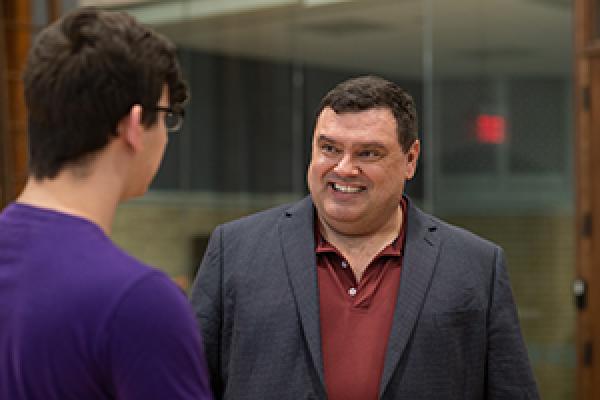Putting deliberative democracy to work during COVID-19

Michael Neblo and his colleagues are working to make our democracy more deliberative and representative — to the benefit of constituents and lawmakers alike. In the face of the COVID-19 pandemic, they are actively connecting citizens and their elected representatives to navigate this period of uncertainty together.
Neblo, a professor of political science and director of the Institute for Democratic Engagement Accountability (IDEA), has tested online deliberative town halls for nearly 15 years. These virtual meetings bring elected officials together with a representative sample of constituents from their state or district around a single issue, which keeps conversations focused, productive and civil.
These town halls are managed through Connecting to Congress (C2C), the latest iteration of an inter-university research collaboration led by IDEA. With new support last year from the Democracy Fund, a bipartisan foundation, C2C recently began a new round of online town halls with members of Congress and their constituents — offered at no cost to congressional offices.
Once the pandemic took hold in the United States, however, priorities quickly shifted.
“The only thing anyone wants to talk about now is COVID-19, and nearly every member of Congress is looking to get in touch with their constituents,” Neblo said.
With new support from the COVID-19 Seed Funding program in Ohio State’s Office of Research, Neblo and his team are now offering these town halls as a two-way exchange for elected officials to share public health messages and for constituents to ask questions and convey how this crisis is affecting them.
With that support, Neblo will examine ways to improve health behaviors by developing guidelines for effective communication between elected officials and the public during the COVID-19 crisis. He and his team will also be able to offer this service to every member of Ohio’s congressional delegation.
C2C has already completed COVID-19 town halls in Oklahoma, Florida and New York, and several others are in its pipeline. In many cases, these town halls will be jointly hosted by a Democrat and a Republican lawmaker, along with a public health expert. For example, the New York town hall on April 23 featured U.S. Sen. Kirsten Gillibrand, a Democrat, alongside Rep. John Katko, a Republican.
“If you get a Republican, a Democrat and health expert participating, it can help clear up a lot of confusion,” Neblo said. “If people are getting consistent messages from both parties, that can help with public health order compliance. One of the big problems right now is that there have been mixed messages between federal, state and local levels.”
Of the two town halls completed so far, 86% of attendees said they now had a better sense of how they can contribute to slowing the spread of the virus, and 96% said that they were willing to share what they learned in the sessions with friends and family.
To engage a true cross-section of constituents, C2C works with a survey company to invite a representative sample of the state or district — akin to doing a representative poll. In doing so, lawmakers have direct access to constituents they typically would not otherwise. In the case of the COVID-19 town halls, constituents outside of the targeted group will also be able to sign up and attend to ensure equal access.
“A big part of what we’re doing is bringing voices into the process who normally don’t participate,” Neblo said. “Those who would turn up to traditional events tend to be unrepresentative — more ideologically extreme, more partisan, wealthier and more white. While there is nothing wrong with engaging these audiences, we want to make sure that the members hear from all of their constituents and not just the usual suspects.”
The C2C team moderates the town halls to keep conversations productive and on topic. Constituents are able to submit questions during the event, which C2C curates and organizes into topics. Questions are never filtered or censored in any way unless they are vulgar, abusive or inciteful — which Neblo proudly says has never happened before, noting the respectful, productive atmosphere that comes from a truly representative sample of constituents.
Over the course of C2C’s previous town halls, 95% of participants have reported back that the events have been beneficial. In the case of the COVID-19 town halls, Neblo hopes the result is the same.
“We hope participants will feel like the events were worthwhile and informative, and that they’ve changed their attitudes and behaviors toward COVID-19 and toward government and their elected officials,” Neblo said. “We also hope people are a little more trusting, more likely to vote, more empowered and more likely to say that their voices are heard.”
Elected officials are hungry for quality engagement with their constituents, Neblo said, and they want to learn how they can better assist those consituents during the pandemic.
“Most elected officials are trying to get this one right,” Neblo said. “They are trying to get high-quality information to their constituents so they comply with good health behaviors and state- and local-level public health orders.”
Above all else, Neblo says constituents are looking to feel respected and reassured that their elected officials are on top of this.
“They want to share their stories about their elderly uncle who died, their niece who works in the ICU without an N95 mask, their son who was going to get married and lost his job,” Neblo said. “They want someone with decision-making power listening to their story.”
Neblo’s C2C collaborators include William Minozzi, associate professor of political science at Ohio State; Kevin Esterling, professor of political science at the University of California, Riverside; David Lazer, professor of political science and computer and information science at Northeastern University; Ryan Kennedy ’04 MA, ’08 PhD, associate professor of political science at the University of Houston; Claire Abernathy, assistant professor of political science at Stockton University; Amy Lee, associate director of IDEA at Ohio State; and several Ohio State graduate students working with IDEA.
